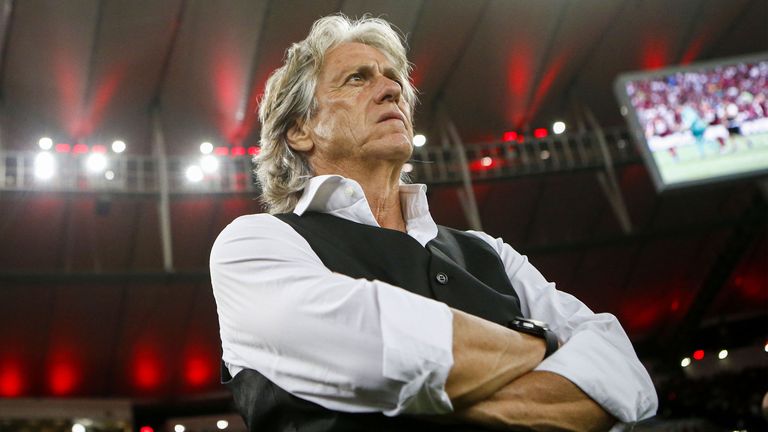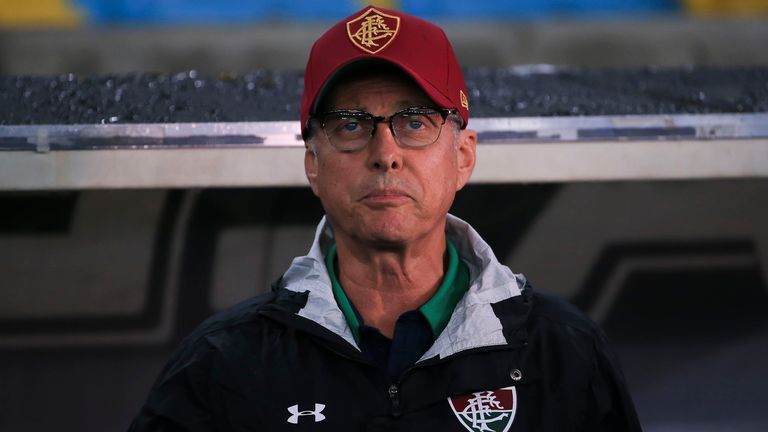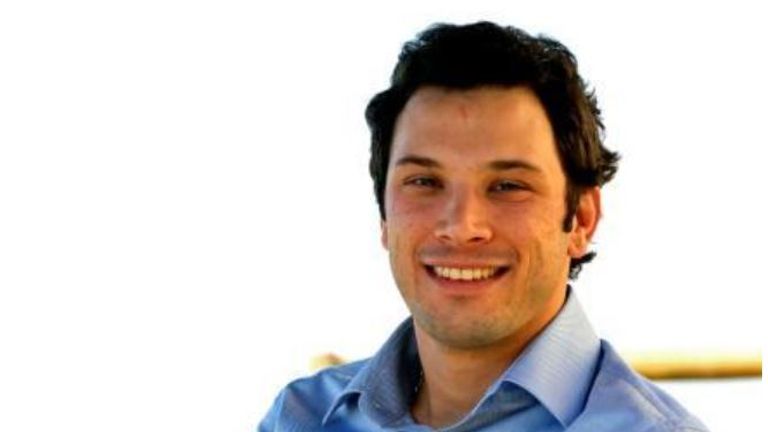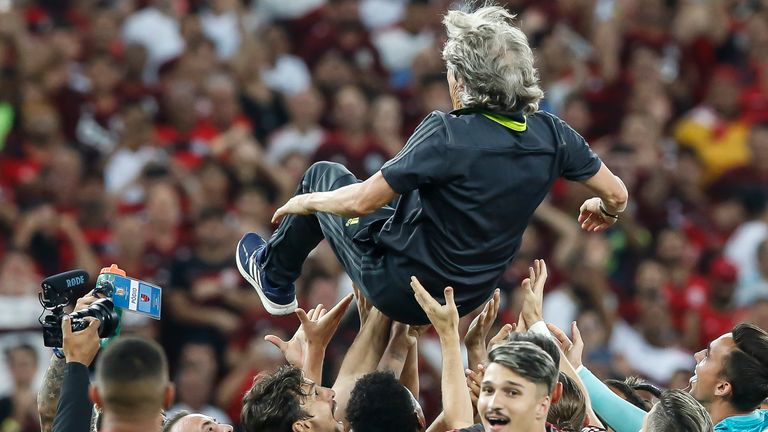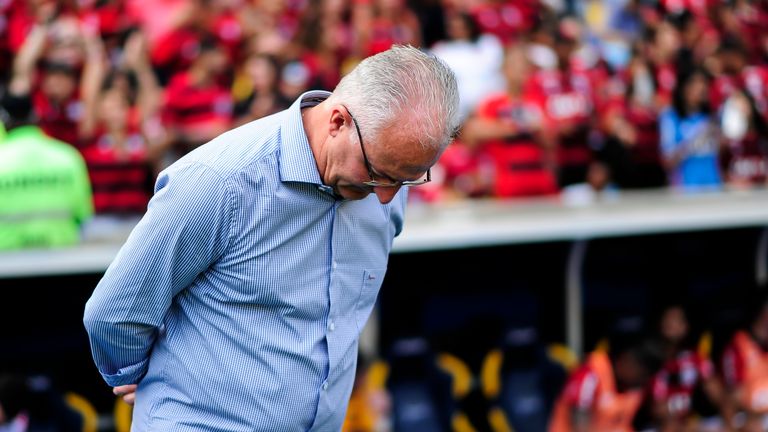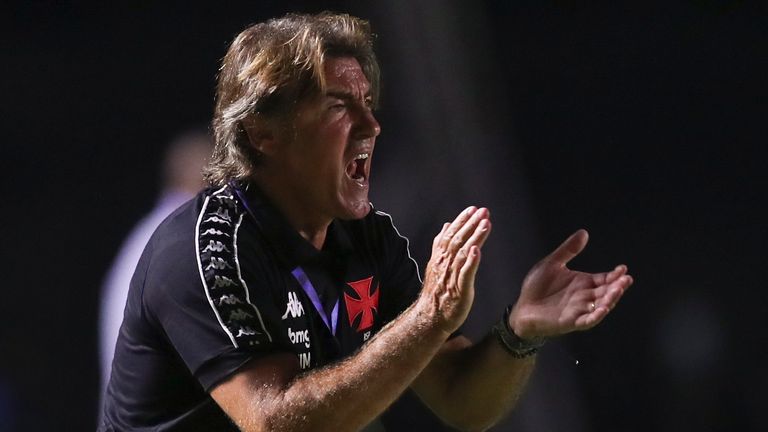Brazil has turned to Europe for coaches but what happened to the Brazilians?
Domenec Torrent's failure to replace Jorge Jesus at Flamengo raises questions about why Brazilian clubs turned to Europe in the first place. With the help of those in Brazil, Adam Bate explores how the most successful nation on earth came to look abroad
Wednesday 11 November 2020 14:43, UK
The story of a proud footballing nation left to turn to continental Europe in search of their coaches is one that is well familiar to fans yet to see an English manager lift the Premier League trophy. But this is a trend that has gripped Brazilian football too.
The success of Portuguese coach Jorge Jesus in delivering Flamengo the Brazilian title and the Copa Libertadores sparked a wave of imitators. Jesualdo Ferreira came and went at Santos. Now Domenec Torrent has gone for failing to reproduce Jesus's success.
Even so, Portuguese coaches Ricardo Sa Pinto and Abel Ferreira are in place at Vasco and Palmeiras, while the presence of the Argentine duo of Jorge Sampaoli and Ramon Diaz at Atletico Mineiro and Botafogo respectively, ensures that four of the traditional 12 biggest clubs in Brazil are currently being coached by foreigners. It is an unusual situation sparking introspection in the country.
"Executives are thinking that if they bring in other 'minds' then maybe they can have the success that Jorge Jesus had at Flamengo," Brazilian agent Ivan Jatoba tells Sky Sports. "They want something different and they believe that it will come from Europe."
But where are the Brazilian coaches? The father of Brazilian football may well have been Charles Miller, the son of a Scottish railway engineer, but the country has managed to win the World Cup five times since then. And each time with a Brazilian coach in charge.
The answer to the question, ironically enough, might be that the supply line of coaches has been stifled at its source by the very executives who are now citing a dearth of talent as they look abroad.
"The way the Brazilian clubs are doing things is definitely wrong," said Jurgen Klopp last year when asked about the situation in Brazil. "The coaches come in for one week, a month or two or three, with the hope that they can perform wonders. It is not possible."
He has a point. Klopp had to wait four years for his first trophy with Liverpool but the average term for a coach of a Brazilian team is around 15 games. The current campaign only kicked off in August but already there are now only six clubs in Brazil's 20-team top division that have the same coach that they started the season with.
It is the sort of turnaround that makes those in the boardrooms of Europe's biggest clubs appear paragons of patience.
"Football here is very different to Europe," says Jatoba. "If a coach loses three matches in a row he will probably lose his job. I know that is crazy but that is how things are in Brazil."
The result is that the same coaches move from club to club in search of that quick fix. There is no long-term plan. There is no point. They come and go, reputations neither diminished nor enhanced, in the knowledge that the next chance - however brief - will soon follow.
Take the example of Oswaldo de Oliveira. He finished his third stint at Fluminense last year having also had three spells in charge at Corinthians and twice having led Flamengo and Santos. The veteran has coached 10 of the big 12 but never lasted two years in the job.
Then there is Dorival Junior. In 2013 alone, he toured Rio, coaching Flamengo, Vasco da Gama and Fluminense. His last job came to a conclusion in August when he was sacked by Athletico Paranaense after four straight defeats. No great surprise, you might think, until you consider that he had missed three of those matches after testing positive for Covid-19.
For the more experienced Brazilian coaches this is the only environment they have ever known and they have long since learned to accept the hand that they have been dealt. They are the survivors of a toxic game and they have adapted their approach accordingly.
But what of those younger Brazilian coaches, the product of a globalised game, inspired by the work of Klopp and Pep Guardiola? For them, it is talk of philosophies that has informed their approach. But this is not the reality of the world that awaits them in Brazil.
Bruno Pivetti is a 36-year-old coach with passion, even writing a book about tactical periodisation, and fresh from his first experience of first-team management with Vitoria.
He lasted 80 days in that particular job, his time cut short in early October after just four defeats and with his team still in the top half of the table. Understandably, he believes in the ability of Brazilian coaches but points to a system that is loaded against them.
"I assure you that many Brazilian coaches are putting in the effort in doing courses, reading football literature, improving our ideas and our methodology," Pivetti tells Sky Sports.
"But the way that Brazilian clubs work does not benefit a long-term process. There is a political situation at clubs where leaders want to stay in power and it causes instability.
"There is a rooted culture in Brazilian football among presidents, directors, advisers, fans and the media, that says you sack the coach if there is a bad result. It leads to absurd situations occurring because of this culture of impatience and weak conviction.
"And nowadays the patience is getting lower and lower."
The consequences of this culture are damaging. It is not just that coaches are not able to fulfil their potential. The result is that the game itself is harmed because coaches - operating out of self-preservation - are encouraged to play risk-averse football.
A lack of imagination in midfield has been a feature of Brazilian football for years now. It is seen as a betrayal of the country's traditions but may well be a natural consequence of another - trigger-happy presidents pushing coaches to be more defensive.
It is what made Jesus' Flamengo side so refreshing to watch - bringing a more expansive game with a higher defensive line and some pressing in the forward areas. It is seen as European but more likely it is because Jesus came from a culture that allows such risk.
Certainly, Pivetti believes the Brazilian environment does not encourage such thinking.
"It is directly affecting the quality of the football," Pivetti explains.
"All the coaches have human needs. One of them is the need to provide for their families. If people are working in fear of being fired, the instinct is to act defensively.
"Brazilian football does not encourage coaches to take risks and test new ideas. The tendency is to stay in the comfort zone, because of the relentless culture of firing coaches."
Pivetti believes many clubs do not even know what they want.
"They are used to looking for a name and not for an idea, because for most of the clubs, there is no definition about the way that the squad wants to play. You can see that in the way that clubs consider opposite profiles of coaches in the same recruitment process."
But what is the solution?
One suggestion is to make it that little bit more difficult for Brazilian clubs to trade coaches. In Italy, for instance, if a coach is fired from his job his contract is still paid up and that individual cannot take charge of another club in the same competition that season.
This is regarded as an unnecessary restriction by some but Pivetti points to the introduction of seat-belt laws in Brazil to help explain how legislation can spark positive change.
"Before 1996 few people in Brazil used to use a seat belt. After the law, the culture has been changed, and nowadays the use of a seat belt is a habit for most Brazilians. We need a law intervention to change this football culture regarding coaches, definitely."
For Pivetti, who has previously worked as an assistant manager with Bulgarian champions Ludogorets, he is resigned to the possibility of leaving Brazil to achieve his ambitions.
"There are some serious football projects in Brazil. Unfortunately, these are exceptions nowadays. For sure, to fulfil my potential as a coach, I might have to go abroad again."
But despite all the concerns about the culture, he remains convinced that he will do so better prepared than before, having been forged by his experiences in Brazil's cauldron.
"The psychological demands on a Brazilian coach are very hard, and every human being that passes through hard situations become mentally stronger for the experience," he insists.
"There is a new generation of coaches coming through who are very well prepared in all aspects. And we have an advantage compared to those coaches from other countries.
"If you are used to working in Brazil then you can work anywhere."

